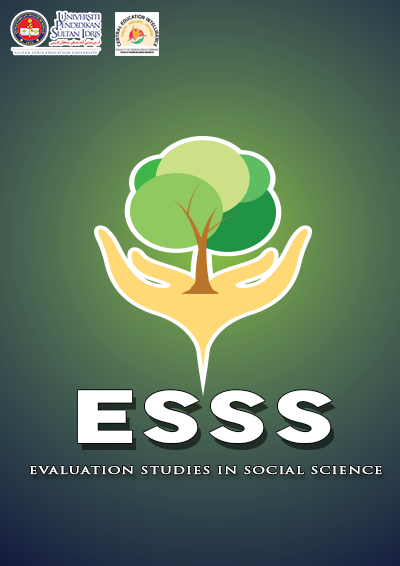Impact of the Wellness Recovery Action Plan (WRAP) on the Psychiatric Patient with Symptoms of Psychosis
DOI:
https://doi.org/10.37134/esss.vol1.2.4.2020Keywords:
Wellness Recovery Action Plan, psychiatric rehabilitation, patients with psychosisAbstract
The purpose of the present research was to determine the effectiveness of the Wellness Recovery Action Plan (WRAP) on the psychiatric patients as group therapy intervention. A total of 8 adult patients including 4 females and 4 males (aged 26-55) were selected through purposive sampling from the outpatient’s department of a psychiatric rehabilitation facility in Karachi. Patients participated in group therapy intervention for (12 sessions/ bi-weekly) for a period of six weeks. The intervention therapy was based on quasi experimental design with pre and post assessment. The Symptom Checklist 90-R was administered to assess pre and post assessment of symptoms frequency and intensity of the patients. Paired t-test for the pretest-posttest analysis was carried out to statistically analyze the impact of the intervention on the patients. Results indicated that there was a statistically significant reduction (M=0.65, SD= .29) (t= 6.26, p<.05) in the overall global symptoms severity of the participants. The study has implications as a structured group therapy program on a small group of patients with severe mental illnesses. Wellness Recovery Action Plan is applicable for the management in psychiatric rehabilitation as evidence based practice for future research.
Downloads
References
Afridi, M.I. (2008). Mental Health: Priorities in Pakistan. Journal of Pakistan Medical Association, 58 (5).
Carlos, P. W., Gill, K. J., Barrett, N. M., & Roberts, M. M. (2007). Psychiatric Rehabilitation, (2nd Ed.). USA: Elsevier Inc.
Canacott, L., Moghaddam, N., & Tickle, A. (2019). Is the Wellness Recovery Action Plan (WRAP) efficacious for improving personal and clinical recovery outcomes? A systematic review and meta-analysis. Psychiatric Rehabilitation Journal, 42(4),372–381.https://doi.org/10.1037/prj0000368
Cook, J. A. (2012). Chicago: Results of a Randomized Controlled Trial of Mental Illness Self-management Using Wellness Recovery Action Planning, Schizophrenia Bulletin, 38(4), 881–891, https://doi.org/10.1093/schbul/sbr012
Cook, J. A., Copeland, M. E., Jonikas, J. A., Hamilton, M. M., Razzano, L. A., Grey, D. D., et al. (2010). Results of a randomized controlled trial of mental illness self-management using Wellness Recovery Action Planning. Schizophrenia Bulletin 38(4), 881-91.
Copeland, M. E. (1997). Wellness Recovery Action Plan. Dimmerston, VT: Peach press.
Copeland, M. E. (2002). Overview of WRAP: Wellness Recovery Action Plan. Mental Health Recovery Newsletter, 3, 1–9.
Derogatis, L.R., & Unger, R. (2010). Symptom Checklist 90-R. USA: John Wiley & Sons, Inc.
Eack, S. M., & Newhill, C. E. (2007). Psychiatric Symptoms and quality of life in schizophrenia. Schizophrenia Bulletin, 33(5). …
Fukui, S.M., Starnino, V.R., Susana, M., Davidson, L.J., Cook, K., Rapp, C.A., & Gowdy, E.A. (2011). Effect of wellness recovery action plan (WRAP) participation on psychiatric symptoms, sense of hope, and recovery. Psychiatric Rehabilitation Journal, 34(3), 214-222. https://doi: 10.2975/34.3.2011.214.222.
Lockwood, C., Page, T., & Conroy, T. (2004). Effectiveness of group therapy and individual therapy in the treatment of schizophrenia. JBI Database of Systematic Reviews & Implementation Reports.
Mak, W.S., Randolph, C. H., Pang, I.Y.H., Chung, N. Y.L. Yau, S. W., & Tang, J.P.S. (2016). Effectiveness of wellness recovery action plan (WRAP) for Chinese in Hong Kong. American Journal of Psychiatric Association, 19 (3), 235-251.https://doi.org/10.1080/15487768.2016.1197859
O’Dwyer, D. (2014). Embracing wellness, self-management, and the positive interface of Eastern and Western psychology. Post-Chartered Doctoral Research Portfolio. City, University of London Institutional Repository. Available at: http://openaccess.city.ac.uk/14565/1/O%27Dwyer%2C%20Denise%20%28redacted%29.pdf Accessed 4 April 2017
O’Keeffe, D., Hickey, D., Lane, A., McCormack, M., Lawlor, E., Kinsella, A., Clarke, M. (2016). Mental illness self-management: A randomized controlled trial of the Wellness Recovery Action Planning intervention for inpatients and outpatients with psychiatric illness. Irish Journal of Psychological Medicine, 33(2), 81-92. doi:10.1017/ipm.2015.18.
Pratt, R., MacGregor, A., Reid, S., & Given, L. (2012). Wellness Recovery Action Planning (WRAP) in self-help and mutual support groups. Psychiatric Rehabilitation Journal, 35(5), 403–405. https://doi.org/10.1037/h0094501
Petros, R., & Solomon, P. (2020). Examining factors associated with perceived recovery among users of wellness recovery action plan. Psychiatric Rehabilitation Journal, 43(2), 132–139. https://doi.org/10.1037/prj0000389
Starnino, V. R., Mariscal, S., Holter, M. C., Davidson, L. J., Cook, K. S., Fukui, S., & Rapp, C. A. (2010). Outcomes of an illness self-management group using wellness recovery action planning. Psychiatric rehabilitation journal, 34(1), 57–60. https://doi.org/10.2975/34.1.2010.57.60
Tharani, A., Farooq, S., Naveed A. (2012). Community mental health services: A way forward to rehabilitate chronic mentally ill patient. Journal of Ayub Medical College Abbottabad, 24(2).
Downloads
Published
How to Cite
Issue
Section
License
Copyright (c) 2023 Tabinda Afzal, Kiran Bashir Ahmed, Asma Perveen

This work is licensed under a Creative Commons Attribution-NonCommercial-ShareAlike 4.0 International License.





